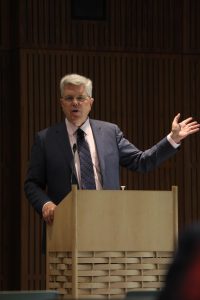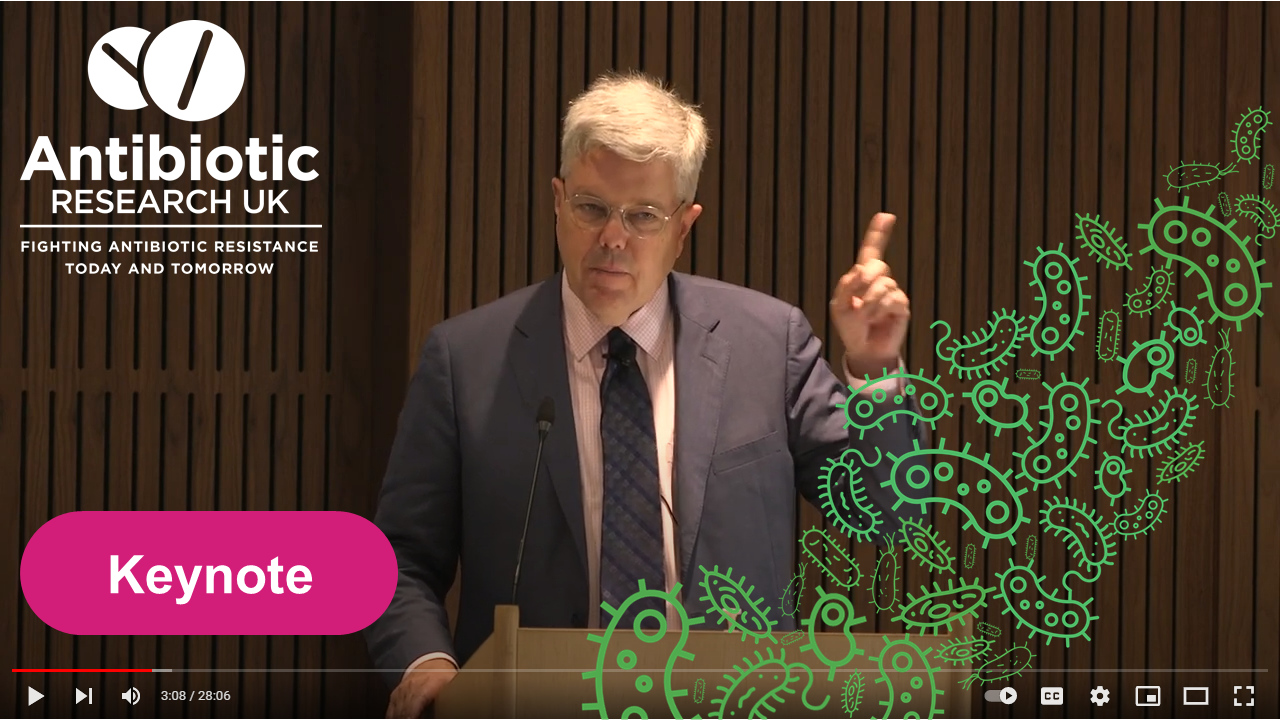Antibiotic Research UK was delighted to present Professor Kevin Outterson, CEO of CARB-X, as the keynote speaker at this year’s annual lecture. Antibacterial effectiveness is a global public good, but is being eroded by resistance and broken business models. Professor Outterson outlined the problems we face from drug-resistant bacteria, and – more importantly – the solutions. He focuses on changing the way health systems and governments buy antibacterials and promote antibiotic development.
 Professor Kevin Outterson, Executive Director of the CARB-X initiative, started his lecture with reference to the school children that could be heard playing outside. His own granddaughter was saved by antibiotics as a newborn; countless other people are in the same position, but many won’t even realise it. Antibiotics underpin a vast number of medical treatments, including all kinds of surgery, as well as chemotherapy, dentistry and more.
Professor Kevin Outterson, Executive Director of the CARB-X initiative, started his lecture with reference to the school children that could be heard playing outside. His own granddaughter was saved by antibiotics as a newborn; countless other people are in the same position, but many won’t even realise it. Antibiotics underpin a vast number of medical treatments, including all kinds of surgery, as well as chemotherapy, dentistry and more.
Kevin likened the antibiotic resistance crisis to discovering a city on fire and only then trying to establish a means to fight the blaze. Antibiotic-resistant infections is the number two cause of death in people with cancer; this is not a surprise pandemic. It affects everyone, yet few people genuinely understand how important antibiotics are in civilisation.
Many of the antibiotics we use are derived from naturally occurring substances that have developed over billions of years of evolution. Yet, we have burned through them in less than a century. Synthetic options exist, but they are difficult to design and create.
Why is paying for antibiotic development complicated?
So why is this such a huge problem? Why are pharmaceutical companies not working night and day to produce the next generation of antibiotic treatments?
Well, it’s just not a commercially viable venture due to the current means of reimbursement. Antibiotics are on a ‘pay per pill’ basis, which means that the more we take, the more money the pharmaceutical companies make. If we are trying to reduce their use, or create new drugs with the hope of never having to use them at all, how does a pharmaceutical company recoup the billions of pounds it costs to develop and test them?
So pay-per-pill options don’t work for these drugs in the way that they do for cancer or diabetes drugs, for which resistance is not an issue.
Kevin talked about 18 new potential treatments that may make it to market. While these are promising new drugs, they are likely to only be available in a handful of rich countries due to the cost of releasing them in other locations.
How the UK is leading the way in paying for antibiotic development
“The programme that’s being piloted in the UK – a subscription plan for antibiotics – is exactly what I am describing. We need a way to pay for antibiotics based on their value to society and their preparedness value. Their value to society today and tomorrow. Their value in surgery, their value in cancer [treatment].”
Kevin’s talk changed in tone when discussing a new ‘Netflix-like’ subscription payment model. The UK will be trial this approach for two new antibiotic treatments. This means that, like the popular TV and film streaming service, the provider gets paid the same regardless of how much of their product is consumed. Find out more about how this will work.
It’s a completely new and exciting approach that incentivises companies to develop new antibiotics. This is a first-in-the-world approach that other countries are only talking about (if that), and for which the UK is to be commended.
“You can think of this problem as a chemistry problem, or microbiology or medicine. I think it’s a much broader problem. It’s really a problem about us. It’s how people respond to these things. The planet created these things [antibiotics] and we have burned through them in a couple of generations. So the solution is more than chemistry, microbiology or medicine. It requires lawyers, economists and a change in human behaviour.
What we really need is what you [Antibiotic Research UK] do to engage the public and to activate patients to talk to people who really don’t know that their lives are being saved by antibiotics. We have to tell these stories, or people don’t know what’s being saved.”
Watch our interview with Professor Outterson below.
Closing comments
In summary, Kevin shared his thoughts that “No one is safe until everyone is safe”. We need to develop and test new drugs and pay pharmaceutical companies for this work. And we need to take great care of any new treatments that they produce. We can only tackle this threat by working together.
Professor Colin Garner, Chief Executive of Antibiotic Research UK, said:
“It is a testament to the scale of this issue that Professor Outterson was compelled to speak at our annual lecture. While I echo his enthusiasm for the UK’s approach to reimbursement for those developing much-needed new antibiotics, he’s right to say that we need to do more, and faster. I am very grateful to him for his fantastic talk on this topic and hope that, at our next annual lecture, we will be able to report that other countries are following the UK’s lead in this area.”
Read a full report of all the talks at this event as well as links to more video content.
Stay up to date with everything ‘antibiotic resistance’: sign up for our quarterly newsletter.

